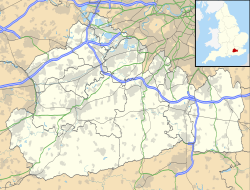History
Frimley Park Hospital was opened to provide a full range of acute services to patients North East Hampshire and West Surrey in 1974. [2] After Cambridge Military Hospital in Aldershot closed in 1996, the hospital was selected by the Ministry of Defence to host one of the Ministry of Defence Hospital Units. [3]
The hospital was built with reinforced autoclaved aerated concrete beams which were the subject of a safety alert in 2019. [4] In 2022 it was announced that operating theatres would be taken out of use to allow for urgent work on their roofs. This would reduce the capacity for operations by around 2,000. Emergency work would also affect its ability to admit elective patients to beds. The reinforcement works, which are temporary, would cost £8.1 million in 2022-23, and around £10 million in subsequent years. [5] On 25 May 2023 it was announced that the hospital will be rebuilt as it contains significant amounts of reinforced autoclaved aerated concrete. [6] The Guardian newspaper noted that a 2020 proposal to rebuild Frimley Park Hospital was not funded by HM Treasury during Rishi Sunak's term as Chancellor of the Exchequer, despite a "catastrophic" grade of risk and a warning that an incident was "likely". [7]
This page is based on this
Wikipedia article Text is available under the
CC BY-SA 4.0 license; additional terms may apply.
Images, videos and audio are available under their respective licenses.


